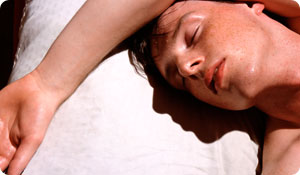
Everybody sweats. It is a natural response to heat, and it helps you maintain a normal body temperature in sweltering conditions. Excessive sweat is another story, however, especially when the air is cool and there is no other apparent reason. If that's the case, your night sweats may be linked to a more serious health condition.
Clinically known as hyperhidrosis, heavy sweating can be a symptom of a medical condition or it can be a medical condition in and of itself. When there is no other cause, hyperhidrosis is thought to have a genetic basis, because it appears to run in families. In this case, excessive sweating usually only occurs in a certain area of the body, such as the head or face, armpits or the bottom of the feet. Primary hyperhidrosis rarely affects the whole body and rarely occurs at night.
Hyperhidrosis that is secondary to another medical condition however, is another story. It often occurs at night and may not be limited to a specific body part. Some of the medical conditions that may cause secondary hyperhidrosis include diabetes, hyperthyroidism, cancer, anxiety disorders and heart or lung disease. If you are a woman, night sweats may signal the onset of menopause or they may occur after you are already in menopause. Excessive sweating can also be a side effect of many different types of medication but, in most cases, this occurs only in a small number of people.
If you sweat excessively and do not know why, make an appointment with your doctor for an assessment. In addition to performing a general physical exam, your doctor will consider the areas on your body where you sweat, how long you've had the problem, your family medical history, and your description of the problem. Once the doctor determines whether you have primary or secondary hyperhidrosis, a treatment plan can be developed. If night sweats indicate an underlying medical condition, treatment will be directed at the condition itself and may or may not help with nighttime sweating.
Small lifestyle changes can help diminish your discomfort, regardless of the underlying cause. Practical solutions include covering pillows and/or sheets with towels, sleeping with a fan on in the room, and generally avoiding caffeine, alcohol and spicy foods.
Sources:
International Hyperhidrosis Society: About Hyperhidrosis. Web. 23 Mar 2011.
http://www.sweathelp.org/English/HCP_Hyperhidrosis_Diagnosis.asp
New York University Langone Medical Center: Hyperhidrosis. 2010. Web. 23 Mar 2011.
http://www.med.nyu.edu/content?ChunkIID=11768





